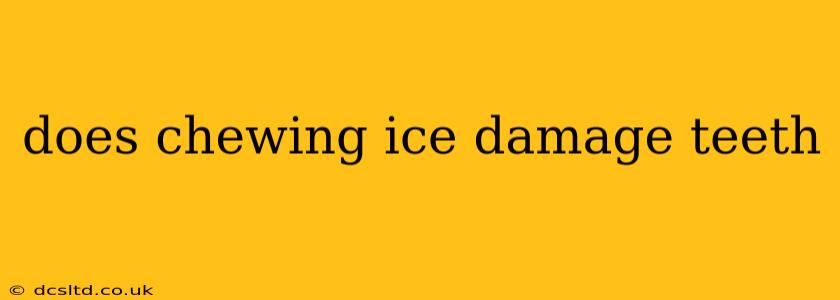Chewing ice, that satisfying crunch, might seem harmless, but the truth is, it can significantly damage your teeth. This seemingly innocuous habit can lead to a range of dental problems, from minor chips to serious cracks. This comprehensive guide will explore the detrimental effects of ice chewing and answer common questions surrounding this habit.
Why is Chewing Ice Bad for Your Teeth?
Ice is incredibly hard, much harder than your teeth enamel. When you chew ice, you're essentially subjecting your teeth to a high-impact force that can cause various forms of damage. This forceful action can lead to:
-
Cracked or Chipped Teeth: The most common consequence is fracturing or chipping of the enamel. This can lead to increased sensitivity, pain, and the need for expensive dental repairs. Even small cracks can weaken the tooth structure, making it more vulnerable to further damage.
-
Fractured Fillings: If you have existing dental fillings, chewing ice can dislodge or fracture them, exposing the underlying tooth structure to decay and potential infection.
-
Worn Enamel: Repeated chewing of ice wears down the protective enamel layer over time, leaving your teeth more susceptible to cavities and sensitivity. This erosion weakens the tooth and makes it more prone to further damage.
-
Increased Tooth Sensitivity: As the enamel wears away, the dentin layer underneath is exposed. Dentin contains microscopic tubules leading to the nerve of the tooth, making your teeth highly sensitive to hot, cold, sweet, or acidic foods and drinks.
-
Temporomandibular Joint (TMJ) Disorders: The repetitive forceful chewing motion can also strain the temporomandibular joints (TMJs), leading to jaw pain, headaches, and clicking or popping sounds in the jaw.
How Can I Stop Chewing Ice?
Breaking the habit of chewing ice can be challenging, but it’s crucial for your dental health. Here are some strategies:
-
Identify Triggers: Understanding why you chew ice is the first step. Is it boredom, a nervous habit, or a response to a particular food or drink? Identifying these triggers allows you to address the underlying issue.
-
Find Healthy Alternatives: Keep your mouth busy with healthy substitutes. Try chewing sugar-free gum, carrot sticks, or other crunchy, yet less damaging, alternatives.
-
Mindfulness and Awareness: Pay attention to when you are chewing ice. This conscious awareness can help you catch yourself in the act and stop before significant damage occurs.
-
Professional Help: If you struggle to break the habit independently, consider seeking guidance from a therapist or counselor who can help you address the underlying causes of your behavior.
What are the Signs of Ice Chewing Damage?
Recognizing the signs of ice chewing damage is crucial for early intervention. Be vigilant for:
-
Sudden tooth pain or sensitivity: This could indicate a crack or chip.
-
Visible chips or cracks: Inspect your teeth regularly for any signs of damage.
-
Discolored teeth: Cracks can allow staining agents to penetrate the tooth, resulting in discoloration.
-
Increased sensitivity to temperature or pressure: This is a common sign of enamel erosion.
Can I Repair Ice-Chewing Damage?
Yes, dental professionals can repair various types of ice-chewing damage. Treatments can range from simple bonding to more extensive procedures like crowns or root canals, depending on the severity of the damage. Early detection and treatment are essential to minimize further damage and restore your oral health.
How Much Ice is Too Much?
There’s no set amount of ice that is universally considered "too much." The damage isn't solely determined by the quantity but more so by the force applied and the frequency of the habit. Occasional chewing of a small piece of ice is less likely to cause harm compared to frequent, forceful chewing of large chunks. The key is moderation and awareness.
Is it okay to chew ice after a tooth extraction?
Absolutely not. Chewing ice after a tooth extraction is highly inadvisable. The area is already vulnerable and sensitive, and chewing ice could dislodge the blood clot, leading to complications like dry socket, a painful condition. Follow your dentist's post-operative instructions carefully.
In conclusion, while the occasional nibble of ice might not cause significant harm, habitual ice chewing is detrimental to your dental health. Understanding the risks and taking proactive steps to break this habit can save you from costly dental repairs and significant discomfort. Remember, maintaining good oral hygiene and regular dental checkups are essential for preventing and addressing any dental problems.
